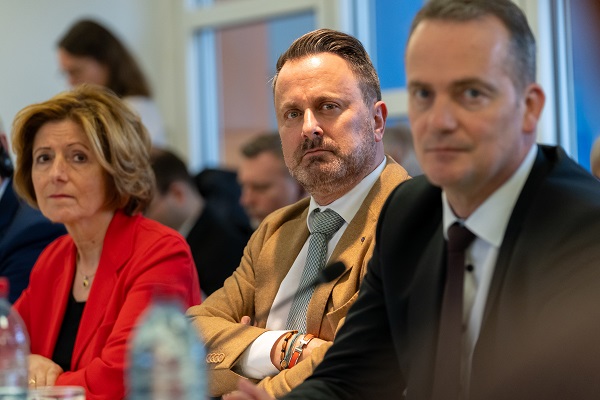 (L-R) Malu Dreyer, Minister-President of Rhineland-Palatinate; Xavier Bettel, Luxembourg's Deputy Prime Minister, Minister of Foreign Affairs & Foreign Trade; Oliver Paasch, Minister-President of the German-speaking Community of Belgium;
Credit: © SIP / Emmanuel Claude
(L-R) Malu Dreyer, Minister-President of Rhineland-Palatinate; Xavier Bettel, Luxembourg's Deputy Prime Minister, Minister of Foreign Affairs & Foreign Trade; Oliver Paasch, Minister-President of the German-speaking Community of Belgium;
Credit: © SIP / Emmanuel Claude
On Tuesday 12 March 2024, Luxembourg's Deputy Prime Minister, Minister of Foreign Affairs and Foreign Trade, Xavier Bettel, visited the Maison de la Grande Région (House of the Greater Region) in Esch-sur-Alzette.
The Deputy Prime Minister was accompanied on this visit by Malu Dreyer, Minister-President of Rhineland-Palatinate (Germany) and President of the Greater Region Summit, Oliver Paasch, Minister-President of the German-speaking Community of Belgium, Brigitte Torloting, Vice-President of the Grand Est Region (France), Patrick Weiten, President of the Departmental Council of Moselle (France), Chaynesse Khirouni, President of the Departmental Council of Meurthe-et-Moselle (France), and Brice Fauvarque, Vice-President of the Departmental Council of Ardennes (France).
The visit began with a presentation of the different structures of the Maison de la Grande Région, including the secretariat of the Greater Region Summit, the management authority and the joint secretariat of Interreg, Euregio and Quattropole.
It continued with an exchange with students of the "Urbanisme et Aménagement" Master's degree from the University of Lorraine on the importance of cross-border cooperation in the current European context. The visit concluded with a working lunch devoted to progress of the work of the current presidency, such as renewable energy, mobility and civil protection.
Minister Bettel stated: "I am delighted with this exchange with numerous interlocutors within the Maison de la Grande Région, which will celebrate its tenth anniversary next year. No other cross-border region in Europe is as strongly interconnected as the Greater Region. In this sense, it is a symbol of European cross-border cooperation. The Maison de la Grande Région plays an important role in this context, since it is a place for exchanges and meetings regularly bringing together the different actors of cross-border cooperation."
The minister also highlighted the importance of regular consultation and strengthened cooperation between the different members of the Greater Region, whether for issues affecting residents' daily lives (e.g. mobility and energy) or in crisis situations, such as during natural disasters or the COVID-19 pandemic.








